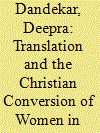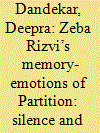| Srl | Item |
| 1 |
ID:
159388


|
|
|
|
|
| Summary/Abstract |
This article foregrounds the interstitial and hybrid third voice of a nineteenth-century Christian convert in colonial India. Bala Shundoree Tagore, a Bengali woman and wife to the esteemed Gyanendra Mohan Tagore, was declared spiritually Christian by missionaries, even though she died before being baptised. Bala's narrative production by her biographers and translators obfuscated and transformed her voice, writing her into the history of Indian missions as a success story. Refashioned as a gendered symbol for Indian Christian women from the nineteenth century, Bala's narrative was utilised by missionaries by divesting her of the agency she possessed.
|
|
|
|
|
|
|
|
|
|
|
|
|
|
|
|
| 2 |
ID:
181334


|
|
|
| 3 |
ID:
168570


|
|
|
|
|
| Summary/Abstract |
This article analyses the Partition narrative of an Ashraf Muslim woman, who was seven years old at the time of Partition. Now resident in California, Zeba Rizvi was interviewed as part of the 1947 Partition Archive project, archived at the Stanford University Library. In this article, I interrogate relationships between memories and emotions of Partition, reconstituted through oral history that suggests the additional reframing of Partition-memory archives as an emotions archive. While Zeba’s interview reveals how emotional gaps are arbitrated by rapport, or absence thereof, I argue, using a phenomenological approach, that Partition memory-emotions conform to the narrator’s evolving and dynamic sense of self through time, that is also evident in the interview. Zeba Rizvi resists and reconstructs the politics of Partition in agential ways, using art to express secularism and its emotions: love-pyar, while re-inscribing and conforming to Ashraf values of gender, class and the celebration of heritage.
|
|
|
|
|
|
|
|
|
|
|
|
|
|
|
|